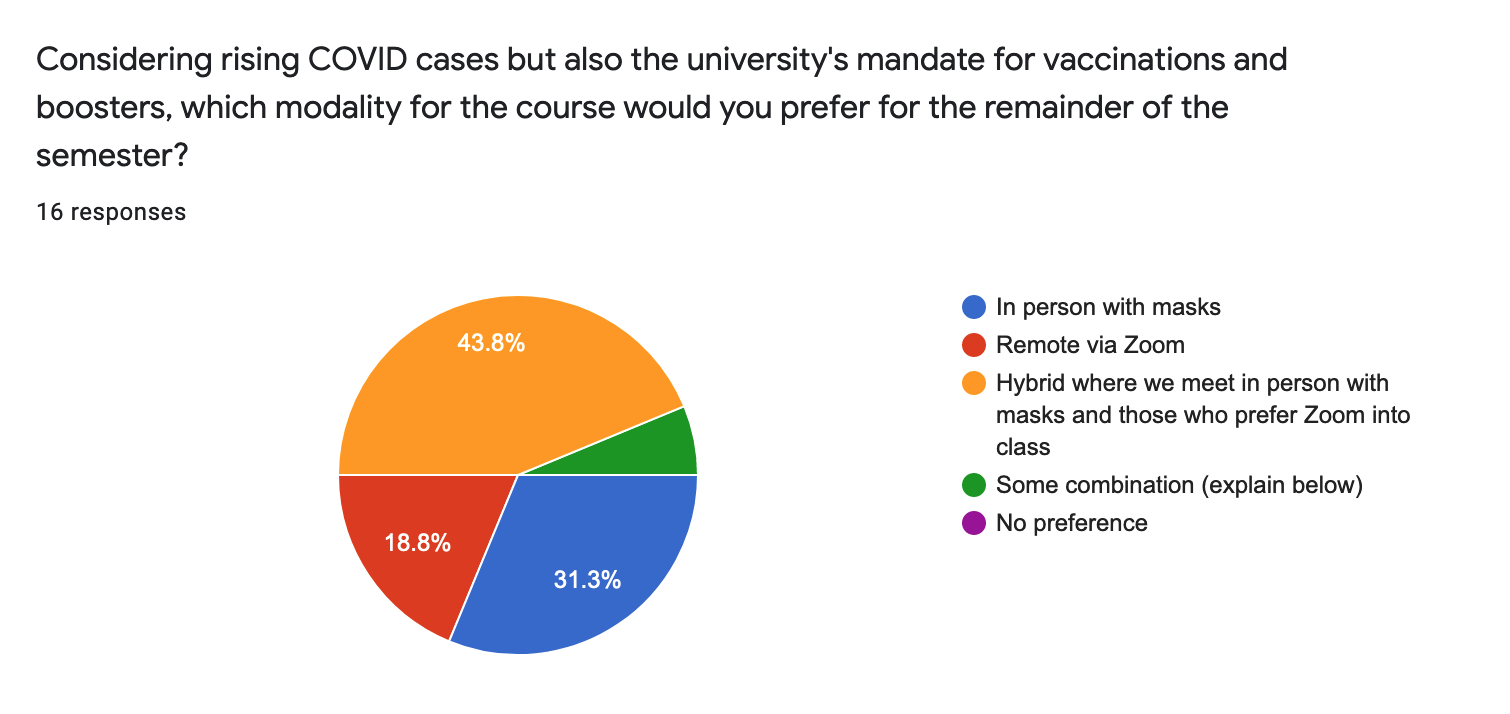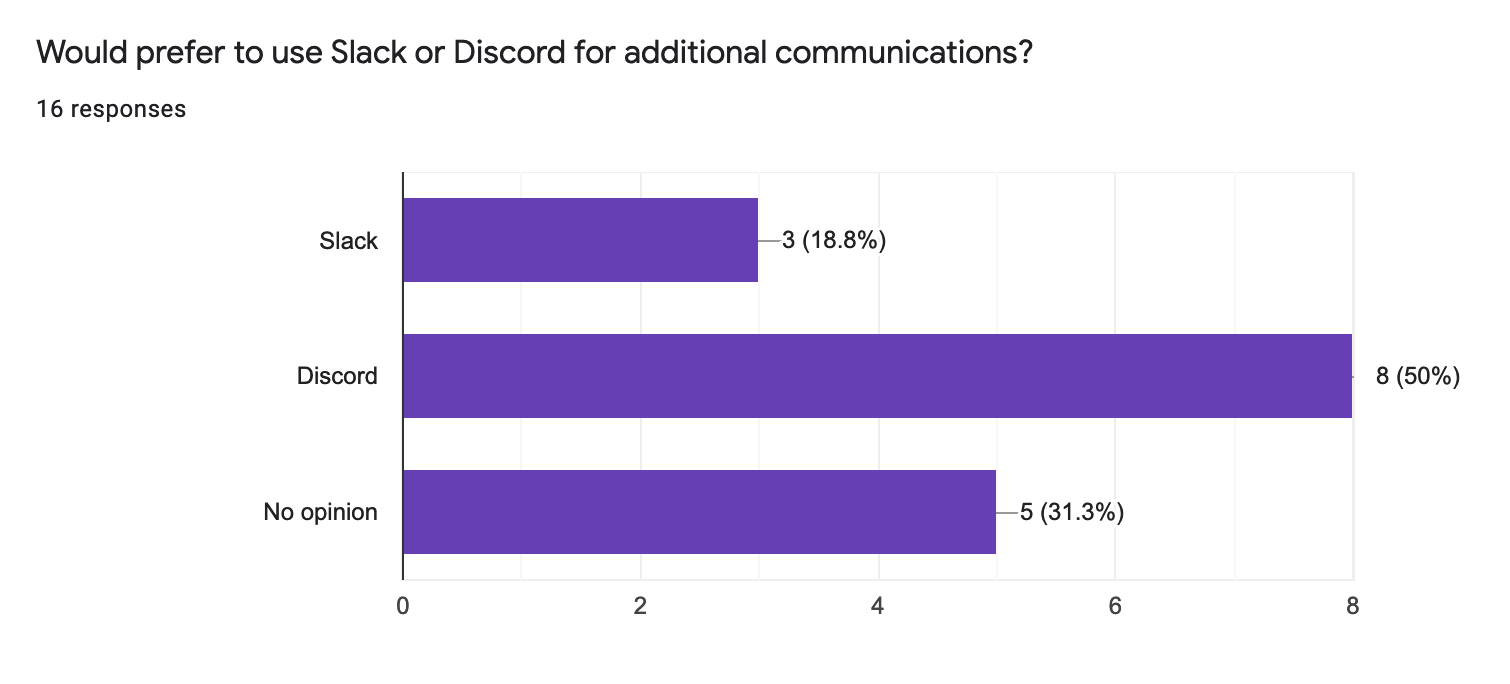🚦Course Policies
COVID-19 & Attendance
iSchool COVID-19 Statement*
In keeping with university and iSchool policy, all students are required to engage in appropriate behavior to protect the health and safety of our community. If you are on campus, this includes being fully vaccinated, wearing a facial covering properly when required, maintaining social distance, if requested, and using hand sanitizer as needed.
If you feel ill or are unable to come to class or complete class assignments due to issues related to COVID-19, including but not limited to testing positive yourself, feeling ill, caring for a family member with COVID-19, or having unexpected child-care obligations, you should contact the instructor immediately as well as your advisor.
University COVID-19 Statements*
Following University policy, all students are required to engage in appropriate behavior to protect the health and safety of the community. Students are also required to follow the campus COVID-19 protocols.
Students who feel ill must not come to class. In addition, students who test positive for COVID-19 or have had an exposure that requires testing and/or quarantine must not attend class. The University will provide information to the instructor, in a manner that complies with privacy laws, about students in these latter categories. These students are judged to have excused absences for the class period and should contact the instructor via email about making up the work.
Students who fail to abide by these rules will first be asked to comply; if they refuse, they will be required to leave the classroom immediately. If a student is asked to leave the classroom, the non-compliant student will be judged to have an unexcused absence and reported to the Office for Student Conflict Resolution for disciplinary action. Accumulation of non-compliance complaints against a student may result in dismissal from the University.
Our COVID-19 Policies: Attendance and Life Happens
The above policies pretty much cover what will happen broadly should you or someone close to you get sick this semester. But to put it more explicitly, your health and wellness is our collective top priority.
In our first class, I requested feedback on which modality we would prefer and this is an overview of the results.

Given the strong preference for in person and hybrid classes, we will be meeting on campus with the exceptions of our first and second week of the course. At any point during the semester, if you believe that you might be sick or been exposed, please refrain from attending in-person class. I am happy to make up missed content (though within reason, I can’t reteach multiple weeks) and also to negotiate missed assignments.
While I will do my best to accommodate hybrid classes, I cannot guarantee that it will be possible to fully engage in seminar remotely. So please only select the hybrid option for either COVID-19 related reasons or because you need to take an information overload class (more on that below). I don’t require doctor notes for any absences and will leave it up to your judgement on whether you feel comfortable coming to class or not. But please keep in mind that if you miss a substantial portion of discussions, it will be difficult to complete the final project.
Information Overload Days:
I realize that we are still in a global pandemic and that at points throughout the semester you might simply need a break. Instead of missing class because you are overwhelmed with your workload, please let me know and consider taking an information overload day rather than missing the seminar outright. If you let me know in advance that you need more bandwidth for whatever reason, you will be excused from the assigned materials and in-class discussion. Instead you will be expected to actively listen to the discussion and then consult with the instructor about how to make up any relevant assignments at a later date. I realize the workload for this course is significant and that you are balancing a number of other commitments at the same time, so information overload days are intended to help you manage your stress and at the same time help you not fall behind in the course. You are welcome to two of these without any questions, but after that point it would be helpful to have a conversation about your situation so that you don’t fall behind.
Worst case scenarios: In the scenario where I am no longer able to teach due to COVID-19, I will do my best to find substitute instructors through the iSchool. If you or someone close to you becomes ill and you are no longer able to attend class or complete the final project, I will in consultation with you determine a final grade based on your existing work, and/or advocate for you to be able to move the course to pass/fail (I’m new to the iSchool but assuming it has this option).
Depending on the urgency of your situation, I realize that communicating with your instructor is a low priority, but please get in touch when you can to let me know if anything comes up. Communication and Respect
For the first two weeks, we will use Zoom for our seminars and students should have access to links through our Canvas course site (please let me know if you don’t for whatever reason!). Students are not required to have their video on, but are encouraged if they are able to. I will also be using Zoom for one-on-one meetings. We will ideally be using Zoom synchronously, but given the increased internet usage we may need to find creative solutions to account for variable internet connections. Please let me know if you are concerned about your internet connection or if you’re having difficulties connecting to a call.
In terms of Zoom etiquette, we will be learning what works best for our course meetings. Understandably we will likely interrupt one another and at times struggle to hear each other. I ask that you each try to continue to be respectful and engaged, but again if you have concerns, please let me know. Such a policy also applies to our in-person meetings, where we will need to navigate how to communicate with masks.

After our first meeting, we have collectively decided to use Discord as our preferred communications platform. While I will still send out notifications via Canvas (as well as post materials and grades there), I will primarily expect most of our communications to be via our IS310 Discord.
You are always welcome to email me as well (my email again is zleblanc@illinois.edu), and visit my Office Hours, which will be virtual as well. My hours are directly after class on Tuesdays and Thursdays from 12:20-1pm CST, but I am also happy to meet at other times as requested. I will do my best to reply to emails and Discord messages promptly but I will be slower to respond to those that arrive beyond the normal working hours. Full disclosure, Discord will likely be quicker but also happy to communicate via email if you prefer.
Rule of thumb from here on out is when in doubt, ask questions and over-communicate!
Accessibility Statement*
To ensure disability-related concerns are properly addressed from the beginning of the semester, I request that students with disabilities who require assistance to participate in this class contact me as soon as possible to discuss your needs and any concerns you may have. The University of Illinois may be able to provide additional resources to assist you in your studies through the office of Disability Resources and Educational Services (DRES). This office can assist you with disability-related academic adjustments and/or auxiliary aids. Please contact them as soon as possible by visiting the office in person: 1207 S. Oak St., Champaign; visiting the website:http://disability.illinois.edu; calling (217) 333-4603 (V/TTY); or via e-maildisability@illinois.edu. NOTE: I do not require a letter from DRES in order to discuss your requested accommodations.
Mental Health Resources*
Diminished mental health, including significant stress, mood changes, excessive worry, substance/alcohol abuse, or problems with eating and/or sleeping can interfere with optimal academic performance, social development, and emotional wellbeing. The University of Illinois offers a variety of confidential services including individual and group counseling, crisis intervention, psychiatric services, and specialized screenings at no additional cost. If you or someone you know experiences any of the above mental health concerns, it is strongly encouraged to contact or visit any of the University’s resources provided below. Getting help is a smart and courageous thing to do –for yourself and for those who care about you.Counseling Center: 217-333-3704, 610 East John Street Champaign, IL 61820McKinley Health Center: 217-333-2700, 1109 South Lincoln Avenue, Urbana, Illinois 61801. The counseling center has resources for all students even if they are not located in Illinois.
Academic and Self Integrity*
The iSchool has the responsibility for maintaining academic integrity so as to protect the quality of education and research in our school and to protect those who depend on our integrity. Consequences of academic integrity infractions may be serious, ranging from a written warning to a failing grade for the course or dismissal from the University. See the student code for academic integrity requirements: http://studentcode.illinois.edu/article1/part4/1-401/
Long story, short: don’t cheat. If you need help, see the instructor. I would rather you turn in work late, than have you plagiarize materials and have to report you for violating the student code.
We’ll discuss what constitutes plagiarism for the course (it gets thorny around coding sometimes), but a good rule of thumb is to cite as much as possible. All scholarship is a collective endeavor, and acknowledging those whose work has influenced you is both intellectually and politically imperative.
Sara Ahmed writes that citation serves as feminist bricks and feminist memory:
“Citation is how we acknowledge our debt to those who came before; those who helped us find our way when the way was obscured because we deviated from the paths we were told to follow. In this book, I cite feminists of color who have contributed to the project of naming and dismantling the institutions of patriarchal whiteness” (Ahmed 17). Acknowledging and establishing feminist genealogies is part of the work of producing more just forms of knowledge and intellectual practice. —Beverly Weber, Digital Feminist Collective
Land Acknowledgement Statement*
We recognize and acknowledge that we are on the lands of the Peoria, Kaskaskia, Piankashaw, Wea, Miami, Mascoutin, Odawa, Sauk, Mesquaki, Kickapoo, Potawatomi, Ojibwe, and Chickasaw Nations. These lands were the traditional territory of these Native Nations prior to their forced removal; these lands continue to carry the stories of these Nations and their struggles for survival and identity. We recognize and acknowledge the role that we have played in shaping the histories of dispossession that have allowed for the growth of the University of Illinois for the past 150 years. This acknowledgement and the centring of Native peoples is a start as we move forward for the next 150 years.